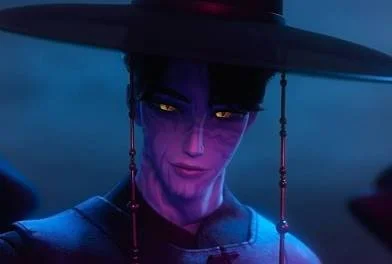K-Pop Demon Hunters
Directed by Maggie Kang
★★★★½
There are movies that catch you off guard—not because of a shocking twist or groundbreaking visuals, but because they deliver an experience you didn’t know you needed. K-Pop Demon Hunters is exactly that kind of film. Going in, I wasn’t a K-pop fan. In fact, I’ve never listened to a full K-pop track (save for BTS’ Dynamite) in my life. But within minutes, I was caught in the dazzling neon vortex of this movie, and by the end, I realized it had done something remarkable: it made me care deeply about three global pop stars who moonlight as defenders of humanity.
The premise itself feels like it shouldn’t work. Rumi, Mira, and Zoey are megastars—selling out stadiums, topping charts, and living the glamorous idol life. But when night falls, they’re not just resting their voices. Instead, they’re hunting demons that threaten to consume their fans and their world. It’s an outrageous blend of pop spectacle and supernatural adventure, and yet the film leans into the absurdity with such confidence and sincerity that it all comes together beautifully.
Visually, K-Pop Demon Hunters is a feast. The movie glows with a dreamlike palette of neon purples, electric blues, and shimmering golds, every frame looking like it could double as a concert poster. The demon designs are sleek and menacing without ever clashing with the film’s pop sensibility. Fight sequences unfold like extended music videos, with choreography so tight and fluid it blurs the line between performance and battle. Even the quieter, more emotional moments are stunning—bathed in soft light that captures the vulnerability behind the pop-star personas.
The film also understands its audience. It doesn’t mock the devotion of fans or the spectacle of K-pop—it embraces them. Concert scenes are depicted with reverence, and the bond between stars and their fans becomes the central emotional spine of the story. When the trio takes up arms against demons, it isn’t because they want to be heroes in the traditional sense; it’s because they feel a responsibility to the people who give them purpose. That message resonates far beyond pop culture—it’s about connection, loyalty, and finding meaning in giving back.
The voice performances are another standout. Each actress captures not only the charm of her character but also the exhaustion, doubt, and determination beneath the surface. The performances never feel exaggerated or hollow; they bring a surprising amount of nuance to characters who could have easily been reduced to stereotypes.
And then, of course, there are the songs. Every track is an earworm. Some are woven directly into the story—rallying an audience mid-battle or disarming demons with sonic force—while others play over montages that elevate the film’s emotional beats. The impressive part is that the songs work both ways: they feel organic in the film’s universe, yet they could just as easily live outside it as chart-worthy hits. Even for someone who’s never touched the genre, I found myself humming them long after the credits rolled.
Most surprising of all, K-Pop Demon Hunters is genuinely emotional. There are moments of sacrifice, friendship, and personal struggle that hit harder than expected. The film balances its glossy exterior with a heartfelt exploration of identity, pressure, and the weight of expectation.
In short, K-Pop Demon Hunters is more than a gimmick. It’s a vibrant, emotional, and endlessly entertaining film that manages to turn spectacle into sincerity. Even if you’ve never listened to K-pop before, don’t be surprised if you walk out with a new playlist—and maybe a tear in your eye.

